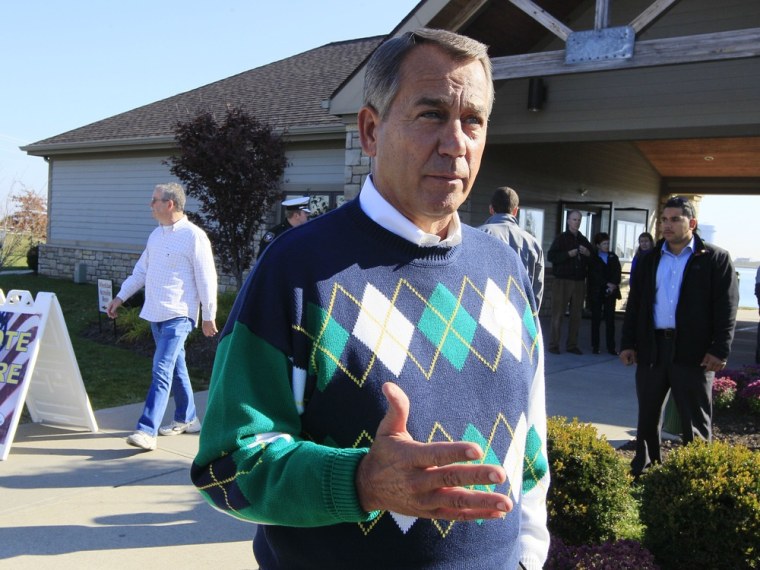Even before voters finished casting ballots in House races across the country, the Republican leadership in the chamber began girding for a major battle over taxes and spending in the weeks after the election.
Confident that Republicans would retain their majority in the House, Speaker John Boehner, R-Ohio, told POLITICO that GOP lawmakers would reject any new taxes on households in the highest income tax bracket.
"We’re not raising taxes on small-business people," Boehner said. "Our majority is going to get re-elected ... We’ll have as much of a mandate as he will — if that happens — to not raise taxes."

Consider Boehner's comments the first public salvo in a coming battle over how to best address the so-called "fiscal cliff," the mixture of automatic tax hikes and spending cuts set to take effect at the beginning of 2013.
Recommended: First Thoughts: Decision Day
The fiscal cliff involves the expiration of the 2001 Bush tax cuts for all tax brackets and a two-year payroll tax cut, both of which are scheduled to sunset at the end of this year, barring action by Congress. Also set to take effect are the automatic spending cuts set forth in the 2011 debt ceiling deal, which were designed to be so distasteful that lawmakers would reach a compromise on how to best address mounting U.S. debt.
A standoff between the Obama administration, a Democratic Senate and a conservative Republican House of Representatives yielded no deal, leaving the fiscal cliff in its stead. Economists have warned that, if nothing happens to change those deadlines, any economic recovery would be imperiled. Moreover, the cuts fall heavily upon the defense budget, a cut which military leaders have warned could endanger American security.
This gridlock might dissipate if voters elect Romney as president on Tuesday. But if Obama wins a second term and the Senate stays in Democratic hands, the stalemate that helped produce so much disillusionment and nastiness this election could rear its head again in the coming weeks.
"You have to do something, and the best way to do it is by growing the economy," California Rep. Kevin McCarthy, the Republicans' whip in the House, said Tuesday on MSNBC. "Now, we are going to have a fiscal cliff between now and the end of the year -- from the debt limit to the looming tax increases to sequestration. But all those ideas have been passed by the House to solve those. It's the Senate that has not acted."
That rhetoric might sound familiar to any reader who has tracked the incessant bickering between the Obama administration and Congress over the past two years.
But amid the bluster that has begun to emerge from Capitol Hill, President Barack Obama's team seemed more upbeat.
"This election, when the president's re-elected, should break this fever of Washington gridlock," Obama adviser Robert Gibbs, the former White House press secretary, said on MSNBC. "It's time that Republicans come to the table and understand that we've got to get something done on the big pressing issues of our time."